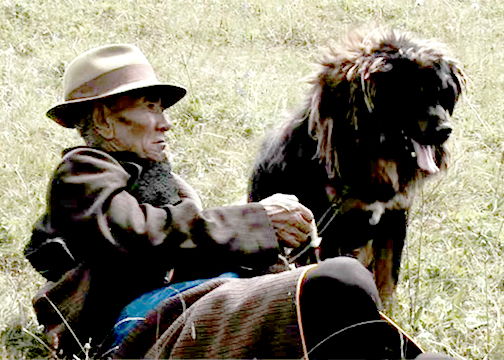Film Review: “Old Dog”
Pema Tseden leads the way for New Tibetan Cinema with his latest beautifully allegorical tale, “Old Dog”, which just had a successful run in the Brooklyn Film Festival and is set to screen in next week’s Northside Festival. The film tells the quietly poetic story of a father (Akhu) trying to preserve the integrity of his valuable companion, the titular Chinese mastiff, while his son (Gonpo) tries to sell it for all it’s worth before local thieves steal him. This familial conflict, which is wrapped in a delicate layer of staggering cultural shifts, plays out slowly throughout the film, revealing the true nature of Tibetan daily life.
Following a neo-realist path, “Old Dog” does not embellish but rather lets the simple narrative tell itself through lingering wide-frame shots of naturalistic settings and complete infusion of diagetic sound. Without many plot twists or advancements, the film is enriched with these natural elements that propel it to it’s inevitable conclusion. Possibly the best scene in the  entire film shows a group of strangers trying to buy the mastiff with a herd of sheep in the distant background and the dialogue occurring in the foreground with a fence standing between Akhu and the buyers.
entire film shows a group of strangers trying to buy the mastiff with a herd of sheep in the distant background and the dialogue occurring in the foreground with a fence standing between Akhu and the buyers.
After Akhu steadfastly turns down the offer and walks away, a sheep is left on the opposite side of the fence, struggling to jumper over and join his pack. The camera lingers on this scene for a while as the sheep moves closer to the foreground and eventually makes it to the other side reunited with his stock, creating an incredibly moving moment for the audience (there was even a brief moment of applause). Though partially planned (Tseden mentioned that they left the sheep on the other side of the fence on purpose to see what would happen) the cinematic beauty of the sheep moving closer to the audience and eventually succeeding was all unscripted and left an air of magical sincerity for the rest of the film.
While each interaction between characters feels distant and plays out like a business transaction whether it is between men trying to buy the dog from Akhu, or Gonpo and his wife struggling to procreate, they are filled with an emotional subtlety that points to the authenticity of the tension felt within the film. This is the Tibet that Tseden himself knows, this is his own visual poetry. “Maybe you noticed that many scenes in the movie don’t contain a lot of sky — the shots were framed very level, or horizontal. We wanted to create a very sad feeling through this. When you watch the movie, and the dog is killed, in many ways it’s kind of a liberation. The dog is liberated in a way, and the old man is too. At the end, he climbs a hill, which has some symbolic meaning, because at the end of it, it is closer to the sky,” explained Tseden.
During a Q&A with director Tseden after the BFF screening, it became clear that Tseden’s goal was to showcase the reality of the way Tibetan life is shifting from strictly traditional practices and modernizing in an unsettlingly manner. The juxtaposition between this fleeting rural simplicity and an inevitable modern day corruption haunts every scene of “Old Dog”. The opening scene alone introduces this theme immediately with Gonpo riding a motorcycle throughout the rural town that looks more like a post-apocalyptic society. This physical decay is reinforced through the moral decay of the narrative story in which an innocent friendship between man and dog is turned into an object of greed and envy for those around him. No longer can Akhu simply enjoy his companionship, but must go to extreme lengths to make sure his dog (who he seems to like more than his dead-beat son) is not objectified into a material possession.
With an ending so explosive yet poignantly presented, Tseden leaves the viewer heartbroken and shocked at the severity of the situation (so shocked that it took up about half of the Q&A). With such a powerful audience reaction it seems clear that Tseden is en route to a successful festival circuit and s strong future for New Tibetan Cinema.



